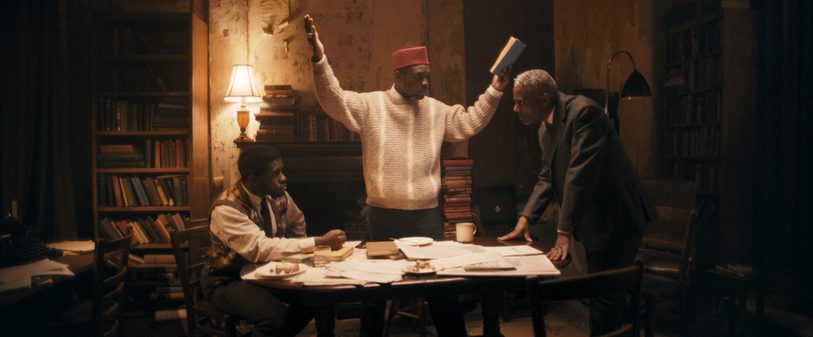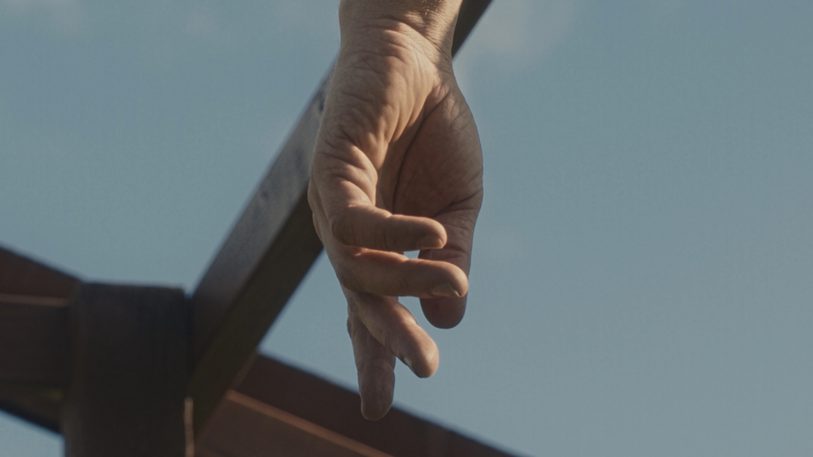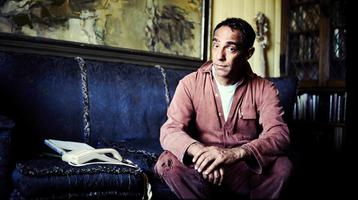
Tendai Mutambu
I.
London in the 1940s and 1950s roiled with anticolonial and Black feminist energies. Claudia Jones, Una Marson, Amy Ashwood Garvey, Katherine Dunham, and George Padmore, to name a few luminaries, all found themselves at the heart of the metropole, wrestling with the legacies of Empire and attempting to forge some kind of alternative.
Onyeka Igwe’s A Radical Duet (2023) transports us to the late ’40s — a period alive with possibility, as yet untouched by the curdled hopes of a waning Pan-Africanism or the compromises of nationalist governments that were to come. The film consists of three acts: the first two are set in 1947 London, while the final act takes place in the present day. Interspersed throughout its 28 minutes are several black-and-white interludes shot on 16mm film and styled as archival footage. In these charming intermezzi, Igwe maps the presence of London’s mid-century Black intelligentsia: from Africa House to C.L.R. James’s bricked-off doorway to the former residence of Kwame Nkrumah.
But it is on the lives of two lesser-known figures — Funmilayo Ransome-Kuti and Sylvia Wynter — that the film builds its foundations. A Radical Duet’s two fictional protagonists, Adura Falade (a veteran Nigerian activist, socialist, union leader, teacher, women’s rights advocate, and mother) and Sylvie St Hill (a Jamaican dancer, actor, playwright, and critic), draw significantly from the biographies of these two women. Ransome-Kuti, who earned the sobriquet “Lioness of Lisabi” for her campaign against unfair taxes, came to London as part of a delegation petitioning the Colonial Secretary for independence; while Wynter, nearly thirty years her junior, was studying modern languages at King’s College. Given their political affinities and the interconnectedness of London’s Black intellectuals at the time, the crossing of Ransome-Kuti and Wynter’s paths seems plausible. But Igwe, a consummate excavator of archives, found no trace of a meeting. It is here, in this absence where history falls silent, that she intervenes with a fabulist flourish and A Radical Duet is born.

Onyeka Igwe, A Radical Duet (2023), film still. Courtesy of the artist and Arcadia Missa.
The imagined first encounter of Ransome-Kuti and Wynter’s fictional counterparts is an adversarial one. In a plush, wood-panelled university hall, Falade is engaged in an anodyne formal debate until St Hill interjects from the gallery, cutting through the occasion’s politesse with a rebuke of Falade’s technocratic appeals to the opposition and, by extension, to colonial administrative logic. It’s a familiar dynamic: an older generation’s diplomatic pragmatism pitched against the impatience of younger, more combative upstarts.
The second act’s domestic setting is warm and cosy, abundant in rich, tawny hues. In one particularly striking shot, a trio of men locked in a spirited exchange appears freeze-framed in an elegant tableau, like figures in a history painting. Moments later a swift succession of gestures and sounds — the slamming of a fist against a table, the light rustle of newspaper pressed against a face in comic exasperation — is set against asynchronous dialogue. The sequence is a bravura display of Igwe's playful choreographic eye; it gives fine-tuned cinematic expression to the spirit of an age marked by fierce debate.
Around his dining room table, Clive Wellesley Taylor — a preening Hegelian with Trotskyist leanings (loosely based on C.L.R. James, one imagines) — is locked in a lively confab with two younger comrades. Armed revolt and revolution in the style of Haiti? Or trade union-led strikes that hit at the Empire's commercial heart? Here, Igwe is mapping the tensions that have, with stunning regularity, animated internecine debates among activists and political organisers. “When the enemy is not in the room,” as one saying on the Left goes, “we practice on each other.”
Confronted with the question of art’s significance in the struggle for liberation, Igwe admits to doubting its efficacy, though she wants to be persuaded. Generations of activists, critics, and artists before her have weighed in on this vexed issue. In defiance of Taylor and the men around the table who dismiss theatre’s radical potential, Igwe’s film imagines the birth of a new play written collaboratively by St Hill and Falade, an alliance between old and new guard. But most saliently, it comes from a shared understanding that, as St Hill argues, theatre will help the colonised imagine a world that is made in their image.
A Radical Duet’s final act reveals the actors un-costumed, gathered around archival materials in conversation with the filmmaker. They share stories of their own relationships to the characters and places central to Igwe’s research: Ransome-Kuti, Wynter, Paul Robeson, Ivor Cummings, Africa House, the University of Ibadan in Nigeria. The camera lingers and circulates in the room, before the film concludes with a prompt from Igwe to the actors: they will be workshopping St Hill and Falade’s radical play together. And so, our ending becomes a beginning.

Onyeka Igwe, The Miracle On George Green (2022), film still. Courtesy of the artist and Arcadia Missa.
II.
In an echo of Igwe’s enquiry into the role of theatre in consciousness raising, The Miracle on George Green (2022) asks us to consider how music can be deployed for political ends. The film begins with the song O Christmas Tree — reworked during the George Green campaign of the 1990s, when a 250-year-old chestnut tree was threatened by the M11 link road — and ends with The Diggers’ Song, a seventeenth-century ballad calling for shared labour and a society free of lords or masters. The Miracle is thus bookended by the defiant sounds of communal resistance, both old and new.
Igwe centres on a significant moment in the collective history of the commons in the UK. In 1993, activists built a treehouse on George Green in east London, drawing international support to secure a landmark injunction that deemed it a permanent dwelling. For Igwe, who grew up in Leyton, this is a history with personal resonances. She recalls hazy childhood memories of the campaign — schoolchildren writing letters (some excerpted in the film) and local protests that have worked their way into collective lore and memory.
For a few years now, Igwe has described her practice as one addressing itself to the question of how we live together. It’s no small task in our atomising, myopic world where memories of lives once lived otherwise are so swiftly expunged and brutally foreclosed. In The Miracle, Igwe turns our attention to The Diggers and their philosophy of the land as ‘a common treasury’ — an idea that has been picked up by subsequent generations who have made common cause with its radical mission.
The Miracle is expansive in its view outward from George Green to other sites of resistance: summer camps in upstate New York, the Greenham Common protests, squatting communities of the 1990s, the rave scene of the 2000s. Igwe deftly brings into relation archival material and a multitude of voices in her ode to resistance and its afterlives: the experiments in collectivity and the embodied traces left in their wake.
III.
A Radical Duet and The Miracle on George Green engage two distinct and divergent traditions of radical politics in the UK, each with its own sites and modes of articulation: the closed interior spaces of intellectual debate in one, and public outdoor spaces in the other. Yet, like several of Igwe's other films, both are part of a practice that is deeply invested in charting the social history of activism, movement building, rebellion, and how we might creatively revive the archives of dissent left behind. To this end, Igwe's cinema insists that history’s absences and fragments can still yield untold stories and futures.
Tendai Mutambu is a writer, editor, and curator with an interest in contemporary artists’ moving image, the essay film, and Black diasporic practices. Recently he was an Associate Producer of Aura Satz’s Preemptive Listening (2024), and Development Editing Fellow for Logic(s) magazine at Columbia University’s INCITE Institute.



